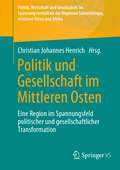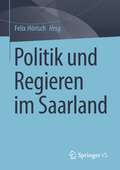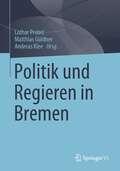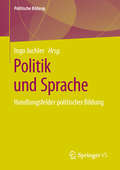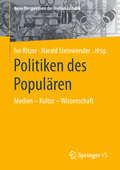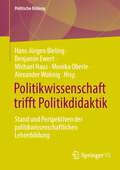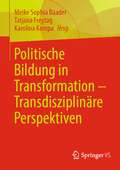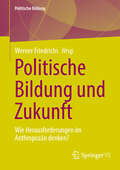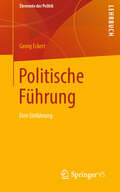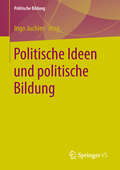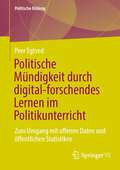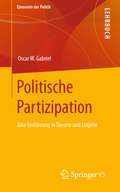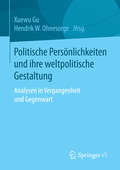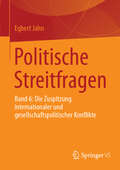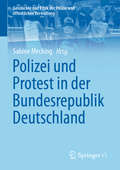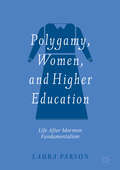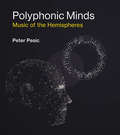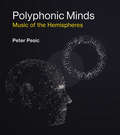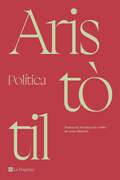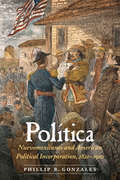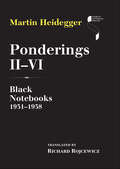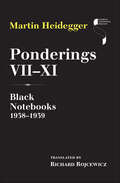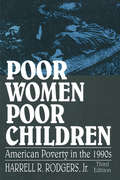- Table View
- List View
Politik und Gesellschaft im Mittleren Osten: Eine Region im Spannungsfeld politischer und gesellschaftlicher Transformation (Politik, Wirtschaft und Gesellschaft im Spannungsverhältnis der Regionen Südosteuropa und Mittlerer Osten)
by Christian Johannes HenrichIn diesem Sammelband werden die historischen, politischen und gesellschaftlichen Facetten der politischen Systeme der einzelnen Länder des Mittleren Ostens analysiert. Auch die Transformationsprozesse in den Gesellschaften im Kontext des Arabischen Frühlings, des Krieges in Syrien, des Bürgerkriegs in Libyen oder des Putsches in Ägypten spielen eine zentrale Rolle. Ebenfalls wird Israel beleuchtet, das als unvollständige Demokratie der einzige Hoffnungsschimmer im Umfeld zahlreicher autoritärer und totalitärer Systeme ist. Die Region ist zudem aufgrund der energiepolitischen Abhängigkeit sehr wichtig für die Europäische Union.
Politik und Regieren im Saarland
by Felix HörischDas Saarland verfügt als jüngstes westdeutsches Bundesland über eine wechselhafte und spannende Geschichte. Dabei ist der (bundes-)politische Einfluss des nach der Bevölkerungszahl zweitkleinsten Bundeslands nicht zu unterschätzen. So verfügt das Saarland nicht nur über die höchste Parteimitgliederdichte aller Bundesländer, sondern hat auch zahlreiche Politiker von bundespolitischer und -historischer Bedeutung hervorgebracht. Darüber hinaus steht es als (ehemaliges) traditionelles Kohle-, Stahl- und Industrieland mitten in einem bedeutsamen Transformationsprozess, den es u.a. als Teil der Großregion mit der höchsten grenzüberschreitenden Mobilität von Arbeitnehmer*innen innerhalb der Europäischen Union zu meistern versucht. Der Sammelband analysiert die Geschichte des Saarlands ebenso wie die Entwicklung des Parteiensystems und der Landesregierungen wie auch die Verortung des Saarlands in verschiedenen Politikfeldern im Vergleich.
Politik und Regieren in Bremen
by Lothar Probst Matthias Güldner Andreas KleeDieses Buch ist die erste umfassende Darstellung des Bremer Institutionensystems, der politischen Akteure, der politischen Kultur und der Wahlen auf den verschiedenen Ebenen des politischen Systems. Die Beiträge analysieren dabei Aspekte wie die Stellung des Landes im Bund und in der Europäischen Union, die Rolle der Senatspräsidenten und ihrer Führungsstile, die Interessenorganisationen und Protestbewegungen, die Bremer Medienlandschaft und arbeiten auch ausgewählte Aspekte der Landespolitik wissenschaftlich heraus.
Politik und Sprache: Handlungsfelder politischer Bildung (Politische Bildung)
by Ingo JuchlerSprache spielt im Hinblick auf politisches Handeln eine sehr bedeutsame Rolle. Die Auseinandersetzung mit dem Verhältnis von Politik und Sprache erscheint umso notwendiger, als dieses Verhältnis in der gegenwärtigen politischen Bildung ein Schattendasein fristet. Der schulischen politischen Bildung kommt die Aufgabe zu, Schülerinnen und Schüler zu einem Umgang mit der politischen Sprache zu befähigen, der ihnen eine reflektierte Auseinandersetzung mit den in der Debatte stehenden politischen Gegenständen ermöglicht – auch und gerade vor dem Hintergrund der Zunahme populistischer Darstellungen, „alternativer Fakten“ und Lügen in der Politik. Mit der vorliegenden Publikation liegt ein erster Aufschlag vor, der das Spektrum des Verhältnisses von Politik und Sprache im Kontext der Handlungsfelder politischer Bildung umreißt.
Politiken des Populären: Medien – Kultur – Wissenschaft (Neue Perspektiven der Medienästhetik)
by Ivo Ritzer Harald SteinwenderDer Band befragt populäre Kultur auf ihre politischen Implikationen in medialen Erscheinungsformen. Dabei problematisiert er die tradierte Dichotomie von „Kunst“ und „Pop“, um den Fokus auf offene Forschungsfragen globaler Wechselwirkungen zu legen und über die akademischen Disziplinen hinaus zu erweitern. Die einzelnen Beiträge des Bandes nähern sich dem Untersuchungsgegenstand anhand mehrerer Konfliktlinien, die ein Themenspektrum von Fragen der Ideologie, Postkolonialität und Queerness populärer Medienkulturen eröffnen. Der InhaltMediale Regimes und Populärkultur ● Genre, Gesellschaft und Politik ● Gender und RaceDie HerausgeberProf. Dr. Ivo Ritzer lehrt Medienwissenschaft an der Universität Bayreuth. Dr. Harald Steinwender ist Redakteur im Programmbereich Spiel – Film – Serie des Bayerischen Rundfunks und Programmplaner für das BR Fernsehen.
Politikwissenschaft trifft Politikdidaktik: Stand und Perspektiven der politikwissenschaftlichen Lehrerbildung (Politische Bildung)
by Michael Haus Monika Oberle Alexander Wohnig Benjamin Ewert Hans-Jürgen BielingVor dem Hintergrund bildungspolitischer und gesellschaftlicher Veränderungen untersucht der Sammelband Stand und Perspektiven der politikwissenschaftlichen Lehrerbildung in zentralen Themenfeldern in Deutschland. Ziel ist es, die Relevanz der Lehrerbildung in der Politikwissenschaft in die gesamte Disziplin hinein zu verdeutlichen, einen vertieften Austausch zwischen Fachwissenschaft und Fachdidaktik zu befördern und Wege zur zukünftigen Aufstellung des Faches im Bereich der Lehrerbildung aufzuzeigen.
Politische Bildung in Transformation – Transdisziplinäre Perspektiven
by Meike Sophia Baader Tatjana Freytag Karolina KempaDer Band geht aus interdisziplinären Perspektiven sich aktuell neu stellenden Fragen der Politischen Bildung nach. Herausforderungen wie Populismus, Prozesse der Re-Nationalisierung und Destabilisierung der EU fordern Akteure politischer Bildung auf, sich grundsätzlich zu öffnen, neu zu orientieren und wirklich neu zu vermessen.
Politische Bildung und Zukunft: Wie Herausforderungen im Anthropozän denken? (Politische Bildung)
by Werner FriedrichsPolitische Bildung bezieht ihren Sinngehalt u. a. aus der Idee einer gelingenden Begegnung mit dem Zukünftigen. Im 3. Jahrtausend muss sie sich allerdings – jenseits der Alternative zwischen einer unausweichlichen, düsteren Katastrophe und einem naiven Machbarkeitsoptimismus – der Frage nach der (un)möglichen Gestaltbarkeit der Zukunft stellen. Denn im Anthropozän wird die Zukunft zunehmend brüchig. Das wirft Fragen von zentraler Bedeutung auf. Wie kann sich die politische Bildung zukünftig auf das Zukünftige beziehen? Welche Themen und Fragen werden zukünftig wichtig sein? Welche didaktischen Methoden und Prinzipien sind zukünftig noch tragfähig? In den Beiträgen wird mit unterschiedlichen Schwerpunkten nach Antworten gesucht.
Politische Führung: Eine Einführung (Elemente der Politik)
by Georg EckertDieses Lehrbuch widmet sich Elementen und Konzepten von Politischer Führung. Weder in der Theorie noch in der Praxis geht sie allein von Führenden aus. Führung machen vielmehr Geführte, indem sie ihre „Leader“ eben „Leader“ sein lassen und „Führungspersönlichkeiten“ besondere Eigenschaften zuschreiben; selbst im notorischen Vorwurf der „Führungsschwäche“ spiegeln sich Machtinteressen und Ordnungsvorstellungen wider.In der repräsentativen Demokratie darf Führung sich indes nicht in Handwerkstechniken zur Machtbeschaffung erschöpfen, sondern bedeutet vor allem Überzeugungs- und Integrationsarbeit: Politische Führung heißt, Angebote zu machen, die – zum Glück – nicht immer angenommen werden. Der Inhalt· Einleitung: Führung zwischen Sehnsucht und Skepsis· Elemente des Führens: Politische Führung als Handwerk· Führung und Verführung: Die Herausforderung der Demokratie· Vom Sinn des Führens: Politische Führung als Idee· Fazit: Führung als Angebot Die Zielgruppen Studierende und Lehrende der Politik- und SozialwissenschaftenPolitische Akteurinnen und AkteurePolitikinteressierte Der AutorDr. Georg Eckert ist Privatdozent für Neuere Geschichte an der Bergischen Universität Wuppertal.
Politische Ideen und politische Bildung (Politische Bildung)
by Ingo JuchlerDieses Buch hat die Beobachtung zum Ausgangspunkt, dass politische Ideen seit jeher das politische Denken und die politische Praxis bestimmen. Sie sind mit dem Politischen verwoben, sei es offensichtlich, implizit oder kaschiert. Doch wie steht es um das Verhältnis politischer Ideen und politischer Bildung? Als Unterrichtsgegenstände stehen sie in den schulischen Curricula. In den einschlägigen Nachschlagewerken der politischen Bildung finden politische Ideen allenfalls indirekt Beachtung. In den Beiträgen des Sammelbandes wird das Verhältnis politischer Ideen und politischer Bildung in seinen unterschiedlichen Dimensionen reflektiert.
Politische Mündigkeit durch digital-forschendes Lernen im Politikunterricht: Zum Umgang mit offenen Daten und öffentlichen Statistiken (Politische Bildung)
by Peer EgtvedStändig stoßen wir auf quantitative Daten, Statistiken und Diagramme im Internet, in Zeitungen und Fernsehen. Dieser Band beschäftigt sich mit dem „digital-forschenden Lernen“ mit offenen Daten und öffentlichen Statistiken im Politikunterricht. Es werden Datenquellen hinsichtlich ihrer Verwendbarkeit im Rahmen des Politik- und Wirtschaftsunterrichts anhand von fachdidaktischen Kriterien untersucht. Ziel ist die Förderung der politischen Mündigkeit der Schüler durch quantitative Daten bzw. Urteils- und Handlungsfähigkeit sowie Datenkompetenz.
Politische Partizipation: Eine Einführung in Theorie und Empirie (Elemente der Politik)
by Oscar W. GabrielPolitische Partizipation ist ein wichtiges Element der Demokratie. Sie legitimiert politische Herrschaft und verbindet die Regierenden und Regierten miteinander. Deshalb beschäftigt sich die empirische Partizipationsforschung schon seit langem mit der Frage, wer sich in welcher Form, aus welchen Gründen und mit welchen Folgen politisch engagiert. Das Lehrbuch gibt einen Überblick über Ausmaß, Formen und Bestimmungsfaktoren politischer Partizipation in Deutschland und führt in die theoretischen und methodischen Grundlagen der empirischen Partizipationsforschung ein.
Politische Persönlichkeiten und ihre weltpolitische Gestaltung
by Xuewu Gu Hendrik W. OhnesorgeDer Sammelband widmet sich der Frage nach dem Einfluss politischer Persönlichkeiten auf weltpolitische Entscheidungen in Vergangenheit und Gegenwart. Dazu werden zu Beginn des Bandes diskutierte Grundannahmen über die Einflussmöglichkeiten einzelner Persönlichkeiten mit Hilfe von detaillierten Fallstudien untersucht und so ein Zusammenhang zwischen Persönlichkeit und Politik an ausgewählten Beispielen und in entscheidenden Situationen der Weltgeschichte herausgearbeitet. Der Band versteht sich damit als ein Beitrag zum lange vernachlässigten personenbezogenen Ansatz der Politikwissenschaft.
Politische Streitfragen: Band 6: Die Zuspitzung internationaler und gesellschaftspolitischer Konflikte
by Egbert JahnIn diesem Buch geht es um die Zuspitzung internationaler Konflikte wie um die Ukraine, Bergkarabach und Palästina sowie um Putins Fehlinterpretation der national-territorialen Struktur der Sowjetunion, außerdem um die Entschärfung des Konflikts um Südtirol und um innenpolitische Konflikte wie die Demokratisierungsversuche im ehemals kommunistischen Europa und die Polarisierung der politischen Öffentlichkeit in westlichen Demokratien. Dabei kommen die Corona-Politik, die Kampagnen gegen den Rassismus, die Migrationspolitik seit 2015, die Neuinterpretation von "linker" und "rechter" Politik, Einschränkungen der Meinungsfreiheit und die gegenwärtige Deutung der Frankfurter Nationalversammlung von 1848/49 zur Sprache.
Politischer Extremismus: Eine Einführung (Elemente der Politik)
by Hans-Gerd JaschkeModerner politischer Extremismus hat viele Facetten: Linke und rechte Varianten, Islamismus, Fundamentalismus und Terrorismus. Der einführende Überblick informiert über diese Begriffe und ihre Hintergründe, über gegenwärtige Szenarien und mögliche künftige Entwicklungen. Auch die aktuelle sozialwissenschaftliche Debatte wird einbezogen. Alle Formen des politischen Extremismus sind Angriffe auf die liberale Verfassungs- und Gesellschaftsordnung. Im Mittelpunkt der Erklärung steht die Abspaltung der politischen Extremismen aus der historischen Konstellation von Liberalismus, Konservatismus und Sozialismus, wie sie sich im 19. und beginnenden 20. Jahrhundert entwickelt hat. Bei der Bekämpfung des Extremismus kann es nicht darum gehen, ihn zu beseitigen, sondern darum, ihn möglichst effektiv einzudämmen.
Polizei und Protest in der Bundesrepublik Deutschland (Geschichte und Ethik der Polizei und öffentlichen Verwaltung)
by Sabine MeckingDie Polizei als Vertreterin des staatlichen Gewaltmonopols gilt als Garantin für die öffentliche Sicherheit und Ordnung im Inneren eines Staates. Von jeher gehört damit das staatliche Protest-Management zu den zentralen Aufgaben der Polizei. Die Art und Weise, wie die Polizei hierbei vorgeht und der Bevölkerung gegenübertritt, gibt Einblicke in den inneren Zustand der Gesellschaft, die politische Verfasstheit und die Herrschaftsordnung des Landes. Der Blick auf die 70-jährige Geschichte der Bundesrepublik offenbart, dass sich sowohl die Inhalte und Formen des öffentlichen Protests als auch der polizeiliche Umgang damit mehrfach verändert haben. Polizeiliche und gesellschaftliche Entwicklungen, obgleich aufeinander bezogen, verlaufen dabei jedoch nicht selten versetzt und in unterschiedlichen Geschwindigkeiten.Prof. Dr. Sabine Mecking lehrt Landes- und Zeitgeschichte an der Philipps-Universität Marburg.
Polygamy, Women, and Higher Education: Life After Mormon Fundamentalism
by Laura ParsonThis volume explores the life stories of women who were former members of Mormon fundamentalist polygamous societies, from their own perspectives, to seek insight into their readiness for higher education settings. In order to support all learners in higher education, it is important to understand the unique needs of women students who have non-traditional formal schooling experiences and/or have come from restrictive or patriarchal cultures. This book helps further the discourse by providing recommendations for inclusive programs that consider how to develop elements of self-concept, empowerment, and motivation necessary for higher education success—academically and beyond.
Polyphonic Minds: Music of the Hemispheres
by Peter PesicPolyphony -- the interweaving of simultaneous sounds -- is a crucial aspect of music that has deep implications for how we understand the mind. In Polyphonic Minds, Peter Pesic examines the history and significance of "polyphonicity" -- of "many-voicedness" -- in human experience. Pesic presents the emergence of Western polyphony, its flowering, its horizons, and the perspective it offers on our own polyphonic brains. When we listen to polyphonic music, how is it that we can hear several different things at once? How does a single mind experience those things as a unity (a motet, a fugue) rather than an incoherent jumble? Pesic argues that polyphony raises fundamental issues for philosophy, theology, literature, psychology, and neuroscience -- all searching for the apparent unity of consciousness in the midst of multiple simultaneous experiences. After tracing the development of polyphony in Western music from ninth-century church music through the experimental compositions of Glenn Gould and John Cage, Pesic considers the analogous activity within the brain, the polyphonic "music of the hemispheres" that shapes brain states from sleep to awakening. He discusses how neuroscientists draw on concepts from polyphony to describe the "neural orchestra" of the brain. Pesic's story begins with ancient conceptions of God's mind and ends with the polyphonic personhood of the human brain and body. An enhanced e-book edition allows the sound examples to be played by a touch.
Polyphonic Minds: Music of the Hemispheres (The\mit Press Ser.)
by Peter PesicAn exploration of polyphony and the perspective it offers on our own polyphonic brains.Polyphony—the interweaving of simultaneous sounds—is a crucial aspect of music that has deep implications for how we understand the mind. In Polyphonic Minds, Peter Pesic examines the history and significance of “polyphonicity”—of “many-voicedness”—in human experience. Pesic presents the emergence of Western polyphony, its flowering, its horizons, and the perspective it offers on our own polyphonic brains. When we listen to polyphonic music, how is it that we can hear several different things at once? How does a single mind experience those things as a unity (a motet, a fugue) rather than an incoherent jumble? Pesic argues that polyphony raises fundamental issues for philosophy, theology, literature, psychology, and neuroscience—all searching for the apparent unity of consciousness in the midst of multiple simultaneous experiences. After tracing the development of polyphony in Western music from ninth-century church music through the experimental compositions of Glenn Gould and John Cage, Pesic considers the analogous activity within the brain, the polyphonic “music of the hemispheres” that shapes brain states from sleep to awakening. He discusses how neuroscientists draw on concepts from polyphony to describe the “neural orchestra” of the brain. Pesic's story begins with ancient conceptions of God's mind and ends with the polyphonic personhood of the human brain and body. An enhanced e-book edition allows the sound examples to be played by a touch.
Política
by AristòtilLa Política, tot i ser un text incomplert i poc homogeni, és l’anàlisi més realista de l’estructura sociopolítica dels estats de l’antiguitat. A la Política, Aristòtil reflexiona sobre l’organització d’una ciutat-estat, la ciutadania i la democràcia, els tipus de constitució i la naturalesa dels governants. Vol evitar que els polítics creguin que posseeixen la veritat absoluta i intentin imposar un ordre determinat fent ús de la violència. Segons el filòsof, l’home és un animal polític per naturalesa, un ésser que ha de viure i participar en l’administració de l’estat i que no es pot resignar que uns altres prenguin per ella decisions que l’afectin. L’obra és, en definitiva, una invitació a qüestionar la tasca del polític tenint en compte la naturalesa humana, la raó i l’ètica.
Política: Nuevomexicanos and American Political Incorporation, 1821–1910
by Phillip B. GonzalesPolítica offers a stunning revisionist understanding of the early political incorporation of Mexican-origin peoples into the U.S. body politic in the nineteenth century. Historical sociologist Phillip B. Gonzales reexamines the fundamental issue in New Mexico’s history, namely, the dramatic shift in national identities initiated by Nuevomexicanos when their province became ruled by the United States. Gonzales provides an insightful, rigorous, and controversial interpretation of how Nuevomexicano political competition was woven into the Democratic and Republican two-party system that emerged in the United States between the 1850s and 1912, when New Mexico became a state. Drawing on newly discovered archival and primary sources, he explores how Nuevomexicanos relied on a long tradition of political engagement and a preexisting republican disposition and practice to elaborate a dual-party political system mirroring the contours of U.S. national politics.Política is a tour de force of political history in the nineteenth-century U.S.–Mexico borderlands that reinterprets colonization, reconstructs Euro-American and Nuevomexicano relations, and recasts the prevailing historical narrative of territorial expansion and incorporation in North American imperial history. Gonzales provides critical insights into several discrete historical processes, such as U.S. racialization and citizenship, integration and marginalization, accommodation and resistance, internal colonialism, and the long struggle for political inclusion in the borderlands, shedding light on debates taking place today over Latinos and U.S. citizenship.
Ponderings II–VI: Black Notebooks, 1931–1938 (Studies in Continental Thought)
by Martin HeideggerPonderings II–VI begins the much-anticipated English translation of Martin Heidegger's "Black Notebooks." In a series of small notebooks with black covers, Heidegger confided sundry personal observations and ideas over the course of 40 years. The five notebooks in this volume were written between 1931 and 1938 and thus chronicle Heidegger's year as Rector of the University of Freiburg during the Nazi era. Published in German as volume 94 of the Complete Works, these challenging and fascinating journal entries shed light on Heidegger's philosophical development regarding his central question of what it means to be, but also on his relation to National Socialism and the revolutionary atmosphere of the 1930s in Germany. Readers previously familiar only with excerpts taken out of context may now determine for themselves whether the controversy and censure the "Black Notebooks" have received are deserved or not. This faithful translation by Richard Rojcewicz opens the texts in a way that captures their philosophical and political content while disentangling Heidegger's notoriously difficult language.
Ponderings VII–XI: Black Notebooks, 1938–1939 (Studies in Continental Thought)
by Martin HeideggerThrough these broad and sprawling notebooks, Heidegger offers fascinating opinions on Holderlin, Nietzsche, Wagner, Wittgenstein, Pascal, and many others. The importance of the Black Notebooks transcends Heidegger's relationship with National Socialism. These personal notebooks contain reflections on technology, art, Christianity, the history of philosophy, and Heidegger's attempt to move beyond that history into another beginning.
Ponderings XII–XV: Black Notebooks, 1939–1941 (Studies in Continental Thought)
by Martin HeideggerPonderings XII–XV is third in a series of four "Black Notebooks" which Martin Heidegger composed in the early years of World War II. As always with Heidegger, the thoughts expressed here are not superficial reflections on current events, but instead penetrate deeply into them in order to contemplate their historical importance. Throughout his ponderings, Heidegger meditates on the call for an antidote to the rampant technological attitude which views all things with a dismissive consumer mentality. Although this volume caused quite a scandal when originally published in German due to references to World-Judaism, English readers with access to the full text can now judge for themselves what Heidegger means in his use of that term. In style, this notebook is less aphoristic and more sustained than the previous ones, but remains probing, challenging, and fascinating.
Poor Women, Poor Children: American Poverty in the 1990s
by RodgersThis work presents the most recent data on poverty, family structure and participation in welfare programmes. It analyses the causes for the continuing rise in female-headed households, the high rates of poverty among such families, and evaluates past, present and future reform policies.
